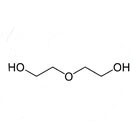What is Diethylene Glycol?
Diethylene glycol (also known as DEG, 2,2-oxydiethanol and diglycol) is a clear, colourless, odourless liquid with the formula C4H10O3. It is soluble both in water and in many organic compounds and has hygroscopic properties which makes it a useful industrial chemical.

Technical Properties
Technical properties of diethylene glycol:
Cas Number: 111-46-6
Molecular Formula: C4H10O3 or (CH2CH2OH)2O
Synonyms: Diglycol, DEG, 2,2-oxydiethanol and dihydroxy diethyl ether
Molecular Mass: 106.12 g/mol
Flashpoint (open cup): 143 °C (290 °F)
Autoignition temperature: 229 °C (444 °F)
Boiling Point: 245 °C (473 °F)
Melting Point: -10 °C (14 °F)
Density: 1.12 at 20 °C (68 °F)
Log P: -1.47
How is it produced?
Production of diethylene glycol is generally based on the demand for, and production of, monoethylene glycol (MEG) as it is a by-product of this production process. The process consists of the oxidation of ethylene at a high temperature in the presence of a silver oxide catalyst. The ethylene oxide is then hydrated to yield diethylene glycol with monoethylene glycol and triethylene glycol as co-products.
The chemical industry tries to maximise the production of monoethylene glycol in this process, however, diethylene glycol is a very useful by-product.
How is it stored and distributed?
Diethylene glycol can be stored in stainless steel, aluminium, or lined drums, tank cars, or tank trucks. It has a specific gravity of 1.118 and a flashpoint of 143 °C (open cup). This results in a flammability rating of 1 under the NFPA 704 indicating the compound requires considerable preheating before ignition could occur. It is not regulated for transport on road, rail, air, or sea but it is classified as harmful and can be toxic if swallowed.
Health hazards
The compound is rated a 1 for health under the NFPA 704 indicating that exposure should only cause a minor residual injury.
The primary health hazard with diethylene glycol is the risk of poisoning. The chemical properties of the compound make it possible to be passed as counterfeit glycerol, a highly versatile, non-toxic compound used as a sweetener in food and an antiviral in the medical industry. Many deaths have occurred because of products produced using glycerol being contaminated with diethylene glycol.
If the compound is swallowed, then fomepizole or ethanol should be promptly administered to prevent metabolism. While fomepizole has minimal adverse effects, it is a highly expensive treatment option. Later in the phases of a poisoning when DEG has metabolised, dialysis may be the only remaining option for the individual.
What is diethylene glycol used for?
Diethylene glycol has a variety of uses in the industry. The tobacco industry makes use of its hygroscopic properties by utilising it as a humectant in tobacco products to control the moisture of the tobacco filler. This same property also makes it useful in the treatment of paper, cork, glue, and cellophane and it is utilised as a dehydrant in the natural gas industry where it removes water from gas pipelines.
The compound is also used as a chemical intermediate in the manufacture of unsaturated polyester resins, plasticisers, acrylate and methacrylate resins, and urethanes. In the U.S. and Western Europe, 51% of DEG is consumed in this way.
However, in Japan, it is mostly utilised as a cement grinding aid. It can also be used in petroleum solvent extraction and can be found in printing ink and drywall joint compounds.
Diethylene glycol is now being displaced by tri ethylene glycol in some of its applications as the lower toxicity of tri ethylene glycol makes it more appealing to manufacturers.
Solventis as your Diethylene Glycol Supplier
Solventis is a leading bulk supplier and distributor of diethylene glycol or DEG in the UK, Europe and globally. As a company with offices in the UK and Belgium, we are proud to be able to offer a personal and efficient service, together with highly competitive prices.
As a result of our state-of-the-art facility in Antwerp, Belgium, we can guarantee the quality, efficiency, safety, and environmental awareness for our whole range of products that is second to none. Please contact us for more information on our diethylene glycol or any glycol from our range on our enquiry form or by phone on +44 (0)1483 203224.



